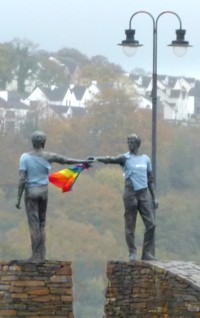The Protestant Plantations
To shore up Protestant Ireland, 'Plantations' were established in under which Protestant Scots and English settlers were offered alienated land in Ireland, further exacerbating the local feelings of injustice and religious persecution, that as we discovered still prevail today, more than five centuries and twenty generations later.
Across Europe seemingly endless wars of religion broke out, bringing an end to the middle ages. In the midst of this the English Revolution took place, resulting in the Execution of Charles I in 1649. The impact on Ireland was the so called 'Protestant Ascendancy'. This was political, economic, and social domination of Ireland by Protestant landowners and the clergy of the Church of Ireland. Lacking the subtlety of the English Church they had become even more rigid in their piety. Politics and high society now effectively excluded Roman Catholics but also Presbyterians and other non-conformist Protestant denominations, along with Jews and other non-Christians. The Roman Catholics who made up the majority of the working population were even excluded from the professions and the poor were often treated as peasants, a step above slaves, part of a property's livestock.
Londonderry one of the Plantations that lasted
This Protestant tradition was an aspect of Ireland I hadn't anticipated. Being brought up in Australia in the 1950's 'Irish' was synonymous with 'Roman Catholic' and almost vice versa, until Italians and Maltese arrived in greater numbers. Sure, Northern Ireland was Protestant but they had not come to Australia in any great numbers. Now I was discovering that the Irish aristocracy, professional and middle classes were Protestant. It was just that they had generally avoided being jailed and transported as convicts; nor did they have the need to flee poverty in the hope of a better life elsewhere.
My paternal grandmother's family, resident in Northern England, were distant decedents of an Irish aristocratic family listed in Burke's Landed Gentry of Ireland. Read more...
Today 78% of the population of the Republic of Ireland is Roman Catholic; while 45% of the population of Northern Ireland is Protestant and 40% is Catholic. Organised religion is on the decline in percentage terms in both countries.

